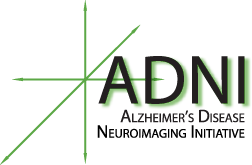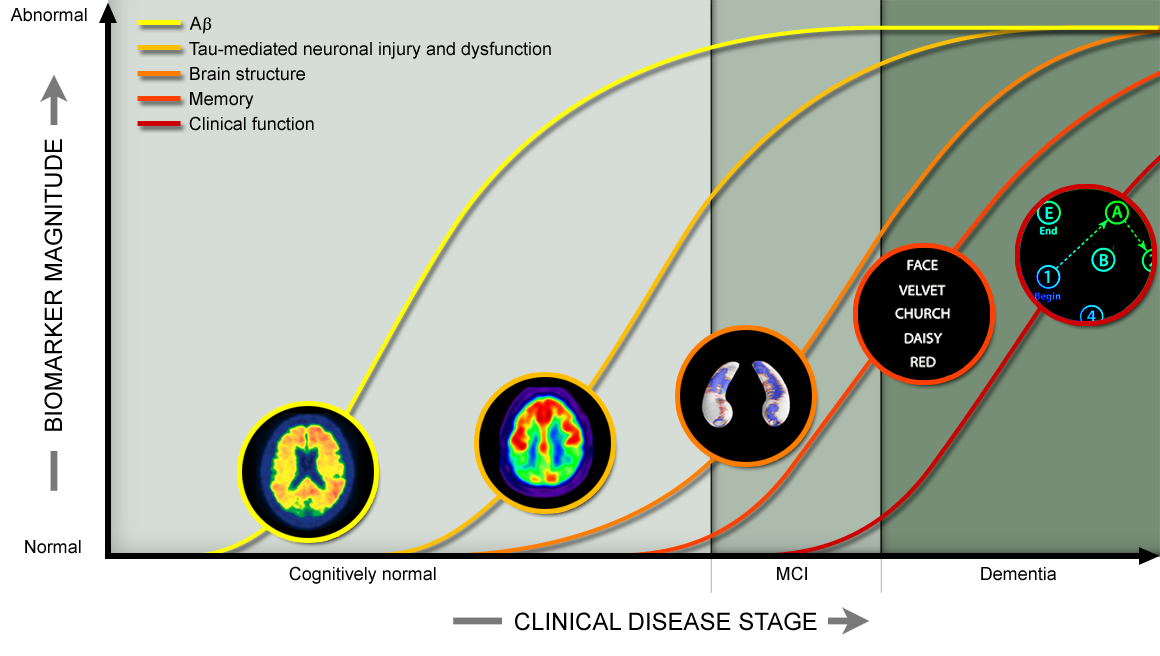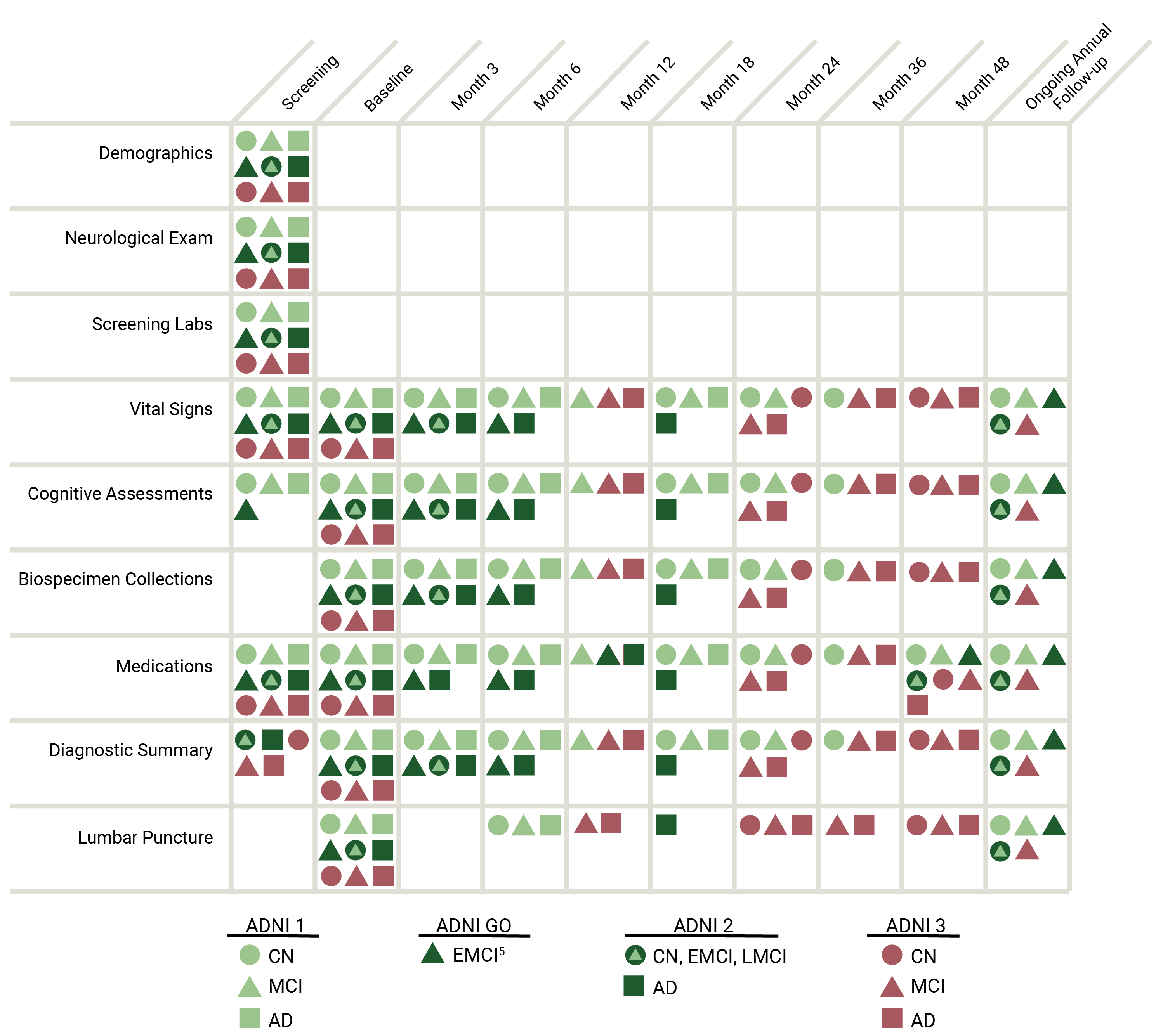Several Alzheimer’s disease initiatives have repurposed the study methods and research network developed through ADNI. The overall goal of these studies is to help define the rate of AD progression. By partnering with related studies of AD, ADNI researchers can access data from a larger study cohort, thereby enhancing their scientific results.
Select each study for details
Worldwide ADNI
WW-ADNI is a collaborative effort of scientists from around the world convened by the Alzheimer’s Association and is the umbrella organization for neuroimaging initiatives being carried out globally. World Wide ADNI (WW-ADNI) unites leading international investigators in a common effort to:
- Help predict and monitor the onset and progression of Alzheimer’s disease
- Establish globally recognized standards to identify and diagnose Alzheimer’s disease
- Document cognitive changes linked to physical changes
- Share data across the international research community
Each WW-ADNI site collects clinical and biomarker data from participants. Biomarker data may include imaging data (MRI, PET) or fluid biomarker data (CSF, plasma). WW-ADNI has a goal of making most of the clinical, neuropsychological, imaging, and biological data gathered available to the scientific community.
The Active WW-ADNI Sites include:
- North American ADNI (NA-ADNI)
- European ADNI (E-ADNI)
- Australian Imaging, Biomarker & Lifestyle (AIBL)
- Japan ADNI (J-ADNI)
- Korea ADNI
- Argentina ADNI
- China ADNI
- India ADNI
Global Alzheimer’s Association Interactive Network (GAAIN)
The Global Alzheimer’s Association Interactive Network (GAAIN) unites a diverse and geographically distributed network of data partners within a federated data platform designed to foster cohort discovery, collaboration, and sharing. GAAIN represents the first open access, federated Alzheimer’s disease data discovery platform of its kind. With GAAIN:
- Researchers can discover clinical, genetic, imaging and other data collected across many independent studies; build cohorts and connect with GAAIN data partners.
- Study investigators can meet data sharing objectives and develop new collaborations.
GAAIN is funded by the Alzheimer’s Association and strives to further the associations goal of accelerating the development of Alzheimer’s disease preventions, treatments, and a cure.
More information about GAAIN can be found here.
Further Reading
ADNI Depression Study
Through dynamic partnerships with the Alzheimer’s Disease Neuroimaging Initiative (ADNI-II) and industry sponsorship, the ADNI-D study is well positioned to successfully address the impact of reduced cerebral blood flow (hypoperfusion), cortical atrophy, and amyloid deposition on cognitive impairment and accelerated cognitive decline in Late Life Depression (LLD) in the context of previously documented relationships between cognitive impairment and subcortical white matter abnormalities and genetic risk factors. ADNI-D is focused on establishing improved diagnostic approaches and targeted treatment trials aimed at LLD and cognitive impairment (CI) associated with LLD, ultimately leading to improved health outcomes and reduced healthcare costs.
Objectives
- To clarify neurobiological substrates of cognitive dysfunction in LLD.
- To clarify the impact of LLD on the rate of cognitive decline over 2.5 years.
- Use biomarkers data employed in ADNI-2 and the NIA AD Genetics Consortium to determine the genotypes needed for the genome-wide association study (GWAS) for pathways and candidate gene studies that investigators may wish to pursue in future studies. Data from participants will be entered into the NIH Genome-Wide database and made available to the scientific community.
Study Design
This is a non-randomized non-treatment study. One hundred and twenty (120) subjects who meet criteria for Major Depression or LLD will be enrolled for a period of 30 months. Data from an additional 300 non-depressed subjects will be used from the previous ADNI studies for comparison. Depression history, symptom severity, and health information will be collected at the initial psychiatric visit to determine eligibility. A 3T MRI and18F-AV-45 amyloid imaging will be conducted at the ADNI site for the initial clinical visit. Collection of plasma and serum for biomarkers, clinical assessments, and cognitive assessments will be conducted at both time points. Blood samples will also be collected for genetic analysis.
Resources
Data Sharing
In order to provide the clinical data from this project to Initiative investigators, the Pharmaceutical Industry and the public, the entire clinical database (free of any identifying information such as name, address, or phone number) will be placed on a public website, which will be appropriately linked to the imaging database at LONI. The database will be frequently updated, and all cleaned clinical data acquired by the ADNI-CC will be provided in real-time.
Department of Defense (DOD) ADNI
Veterans with traumatic brain injury (TBI) and post-traumatic stress disorder (PTSD) appear to have a greater associated risk of Alzheimer’s disease and dementia. The purpose of DOD ADNI is to examine the possible connections between TBI and PTSD, and the signs and symptoms of Alzheimer’s disease on Veterans as they age. The results of the DOD ADNI study will lead to greater efforts to develop treatment and prevention studies to help reduce these long-term effects of TBI and PTSD injuries.
Funded by the Department of Defense (DOD), this study is the first step towards a larger, more comprehensive study of dementia risk factors in Veterans.
Objectives
- Optimize, standardize and validate imaging/biomarkers for AD clinical trials
- Determine biomarkers with high sensitivity to detect a change
- Determine biomarkers which predict future change: identify AD pathology
- Improve clinical AD trials
- Provide data to all investigators
- Create a worldwide network for clinical trials
Study Design
Vietnam War Veterans between the ages of 60-80 years will be identified and contacted using Veterans Affairs records. The enrollment goal is 195 participants divided into three study groups. This study excludes mild cognitive impairment (MCI) and dementia subjects.
Study Participant Groups
- 65 moderate/severe TBI patients without PTSD
- 65 PTSD subjects without TBI
- 65 controls without PTSD or TBI, comparable to groups 1 and 2 in age, gender, and education
Resources
Data
ADNI will provide the following standardized data from enrolled participants. The following data will be available in the DOD ADNI Data Archive to qualified researchers:
- Clinical and cognitive tests
- AFQT, ASVAB
- Medical history
- Cerebral spinal fluid (including tau and phospho-tau levels)
- Genetics blood test
- MRI scans (min. 3T, and DTI processing on TBI subjects where available)
- PET scans (using F18 Florbetapir, no FDG PET)
- 1-year follow-up: all procedures repeated except for PET scan and lumbar puncture
Apply for access to DOD ADNI data >
Login to access Data >
Participate in this study
If you are a Vietnam-era combat veteran suffering from TBI or PTSD and you are interested in participating in this study, please call 1-800-773-4883.
More information about DOD ADNI is available here.
Further Reading
Australian Imaging, Biomarker & Lifestyle Flagship Study of Aging (AIBL)
The Australian Imaging, Biomarker & Lifestyle Flagship Study of Ageing (AIBL) seeks to discover which biomarkers, cognitive characteristics, and health and lifestyle factors determine the development of AD.
Although AIBL and ADNI have many of the same goals, there are differences between the two projects. Read more about the AIBL study from their website.
Study Participants
AIBL has enrolled 1100 participants and collected over 4.5 years worth of longitudinal data.
- 211 AD patients
- 133 MCI patients
- 768 comparable healthy controls
Data
AIBL follows ADNI 1 protocols. Available data includes:
- Clinical and cognitive data
- Image data: MRI, PET
- Biomarkers data: blood, genotype, ApoE
- Dietary/lifestyle assessment
More information about AIBL study data can be found here.
Apply for AIBL data >
Please read through the Access Data page before applying to access ADNI data. Separate Data Use Agreements and review processes exist for each study. Therefore, you will need to abide by a Data Use Agreement before you are authorized to access ADNI data and/or data from any of our collaborative studies.




